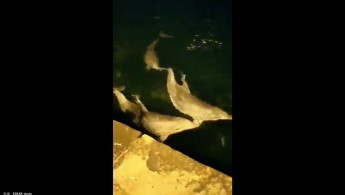WATCH: Dolphins splashdown in Istanbul, as coronavirus lockdown clears Turkey's waters
Istanbul's dolphins are venturing close to shore as Turkey's coronavirus lockdown causes a sudden and sharp decrease in boat and human traffic across the Bosphorus.
A video on social media shows the dolphins swimming by the water's edge near Istanbul's iconic Ortaköy Mosque. The tourist hotspot has quietened considerably amid the coronavirus pandemic, enticing the majestic animals to swim and play in clear view.
"Istanbul's dolphins now hang out very close to the shore, where iconic Ortaköy Mosque and Bosporus Bridge located," one social media user tweeted.
Seeing dolphins in Istanbul's Bosphorus while crossing by ferry has become quite common over the last few years. But dolphins are rarely, if ever, sighted so close to Istanbul's shores.
"The silencing of boat and human traffic have brought them literally to the shore of Ortakoy!" someone remarked on Twitter.
|
Wild animals have been spotted venturing into cities around the world. Coyotes have been seen meandering along downtown Chicago's Michigan Avenue and near San Francisco's Golden Gate Bridge.
A puma roamed the streets of Santiago, Chile, while goats took over a town in Wales. In India, already daring wildlife has become bolder, with hungry monkeys entering homes and opening refrigerators to look for food.
As people across the globe stay home to stop the spread of the new coronavirus, the planet is becoming cleaner and more wild.
Smog stopped choking New Delhi, one of the most polluted cities in the world, allowing Indians to see distant mountains not visible in decades. Nitrogen dioxide pollution has declined by 30 percent in northeastern United States. And in Rome, air pollution levels have plunged 49 percent between mid-March and mid-April, making stars seem more visible at night.
Among other things, researchers are tracking dramatic drops in traditional air pollutants, such as nitrogen dioxide, smog and tiny particles. These types of pollution kill up to 7 million people a year worldwide, according to Dan Greenbaum, president of the Health Effects Institute.
The air from Boston to Washington is the cleanest its been since a NASA satellite started measuring nitrogen dioxide in 2005, said atmospheric scientist Barry Lefer. The air gets clean quickly because this type of pollution, which is largely caused by the burning of fossil fuels, is short-lived, he said.
Agencies contributed to this report.
Follow us on Facebook, Twitter and Instagram to stay connected





 Follow the Middle East's top stories in English at The New Arab on Google News
Follow the Middle East's top stories in English at The New Arab on Google News

![22 Arab countries at COP29 have rejected the targeting of fossil fuels [Getty]](/sites/default/files/styles/image_330x185/public/2024-11/GettyImages-2184289638.jpg?h=199d8c1f&itok=ptHl5bec)
![Dozens of people turned out for the funerals [Getty]](/sites/default/files/styles/image_330x185/public/2024-11/GettyImages-2185229760.jpg?h=e7c891e8&itok=1bctDcE6)